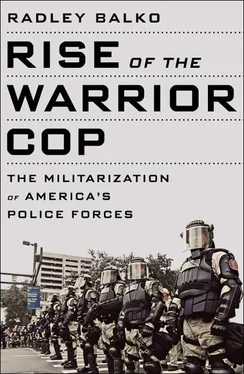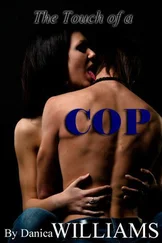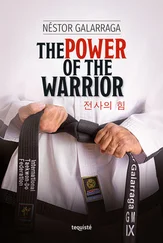Johnson’s efforts didn’t quell his critics. His attorney general, Ramsey Clark, was widely seen on the right as the walking embodiment of the root-causes, soft-on-criminals approach to criminal justice policy. In an interview for this book, Donald Santarelli, a young but influential aide to Nixon’s 1968 campaign, said that Nixon would often tell Republican supporters that his administration would “ have an attorney general,” a bit of signaling that to law-and-order conservatives needed no further explanation. 55
Before the 1968 presidential campaign kicked off, the thirty-one-year-old Santarelli had been the minority counsel on the House Judiciary Committee. In the summer of 1967, he and other House Republicans decided to put together a crime bill that would address (a critic might say exploit ) public reaction to the rioting and high-profile shootings. “There was an increasing fear of crime,” Santarelli says. “And at the same time you had the rise of the civil rights movement, the riots, the Black Panthers, and this increase in drug use. I think the public started to pick up on the idea that these things were linked, because they were all happening simultaneously.” The Republicans put together a bill with a host of new anticrime, antidrug measures, including a provision to authorize wiretapping and another that weakened the Miranda warning. “Law enforcement is just like any other interest group,” Santarelli says. “They’re always after greater power. There was a sense that they needed to capitalize on these historic events. And I think there was a real willingness on the part of the public to give them whatever powers they sought.” 56
There were two other controversial provisions in the original 1968 crime bill. The first would have dramatically changed the bail system—by effectively doing away with it completely. The burden would have been shifted to defendants to show that they didn’t pose a threat to the public or a flight risk. If they could do so, they’d be released. If they couldn’t, they’d be held until trial. Both supporters and detractors dubbed it “preventive detention,” a term that served both sides. For conservatives, it sounded like the sort of rigorous, lock-’em-up policy that would play well in the election. For liberals, “preventive detention” was the sort of term used in a police state. Santarelli stands by the initiative to this day and insists that it was portrayed unfairly. “This was about equity,” he insists. “The risk of flight and the seriousness of the crime are factors in who gets held before trial today, but the primary factor is money. If you can’t make bail, you stay in jail. That’s incredibly unfair. We wanted to take wealth out of the equation.” 57
The other provision was the no-knock raid. Despite the fact that the 1964 Rockefeller law was barely used in New York, other states had since passed similar measures. The law-and-order right had run with the concept as a litmus-test tough-on-crime measure. “The exigent circumstances exceptions to [knock-and-announce] had been pretty well established by that time,” Santarelli says. “I didn’t intend for [no-knock] to be a political weapon, but it became one.”
The Republican crime bill passed relatively easily in the summer of 1968, with little opposition from Democrats. The no-knock raid and preventive detention measures didn’t make the bill’s final draft, but both ideas would return, and soon.
AT 6:01 PM ON APRIL 4, 1968, JUST AS MARTIN LUTHER KING JR. stepped out onto a balcony at the Lorraine Motel in Memphis, Tennessee, James Earl Ray fired a single .30-caliber bullet from the Remington rifle he’d perched in the bathroom window of a boardinghouse across the street. King was dead. Within hours, more than one hundred American cities broke out in rioting.
The riots reinforced in white middle-class America the sense that American cities had become zones of lawlessness. And again, it was black people causing all the violence.
In fact, it came at a time when much of that same white, middle-class America began to sense that its values and traditions were under attack from all sides. In his drug war history Smoke and Mirrors , journalist Dan Baum points out that black homicide arrests doubled between 1960 and 1967. At the same time, heroin deaths and overdoses were also on the rise. The hippie, antiwar, and counterculture movements were in full swing. All of this also coincided with the rise of the civil rights movement. Nixon’s Silent Majority began to see a link between drugs, crime, the counterculture, and race.
The movements had some common elements, but there was little evidence that drug use was causing the spike in violent crime. For example, while it was true that heroin junkies were more likely to commit crimes like burglary and theft to support their habit, it wasn’t true that drug use was causing the surge in violent crime. A 1971 study from the Bureau of Narcotics and Dangerous Drugs—the government’s antidrug enforcement arm itself—found that illicit drug users were 35 percent less likely to be arrested and charged with homicide than non-drug-users, and less than half as likely to be charged with aggravated assault. 58The rise in pot-smoking among the counterculture was even less threatening, and less of a contributor to the crime rate.
But candidate Nixon and his politically savvy advisers seized on the growing assumption in middle America that all of these things were connected. When Robert Kennedy was assassinated in April 1968, the party used his death to push its crime bill, even though his assassination would prove to have been politically motivated, and Kennedy himself had been opposed to the more controversial parts of the law. 59
Months later, at the 1968 Democratic National Convention (DNC), police in Chicago would instigate a riot, then indiscriminately beat liberal protesters. Some of the beatings were aired live by the networks covering the convention. Connecticut senator Abraham Ribicoff was nominating George McGovern to be the party’s candidate during one clash between police and protesters. Ribicoff strayed from the script in his nominating speech to proclaim, “With George McGovern we wouldn’t have Gestapo tactics on the streets of Chicago! With George McGovern, we wouldn’t have a National Guard!” Chicago mayor Richard Daley, who had called up more than twenty thousand police and National Guard troops for the convention, didn’t do much to distance himself from the Nazi smear. Lip readers later alleged he shouted up from the convention floor, “Fuck you, you Jew son of a bitch! You lousy motherfucker! Go home!” 60
Nixon’s “ignored Americans” weren’t the least bit troubled by what they saw from Daley and the police. According to a Gallup poll taken a few weeks later, 56 percent of the country supported the crackdown, and just 31 percent were opposed. 61Polls would also show Nixon surging into a comfortable lead over the eventual Democratic nominee, Hubert Humphrey. 62
In 1969 Newsweek commissioned its own Gallup poll for a cover story headlined, “The Troubled American: A Special Report on the White Majority.” Its findings: 85 percent of whites thought that black militants were getting off too easily; 65 percent thought that unemployed blacks were more likely to get government aid than unemployed whites; and 66 percent thought that the police needed to be given more power. Nearly half thought that the country had moved backward over the last ten years, and nearly 60 percent thought that things were only going to get worse. 63
Crime, race, hippies, antiwar protesters—Nixon strategists needed a way to draw all of the concerns of his Silent Majority together. As Baum explains, they found their answer with drugs.
Читать дальше













